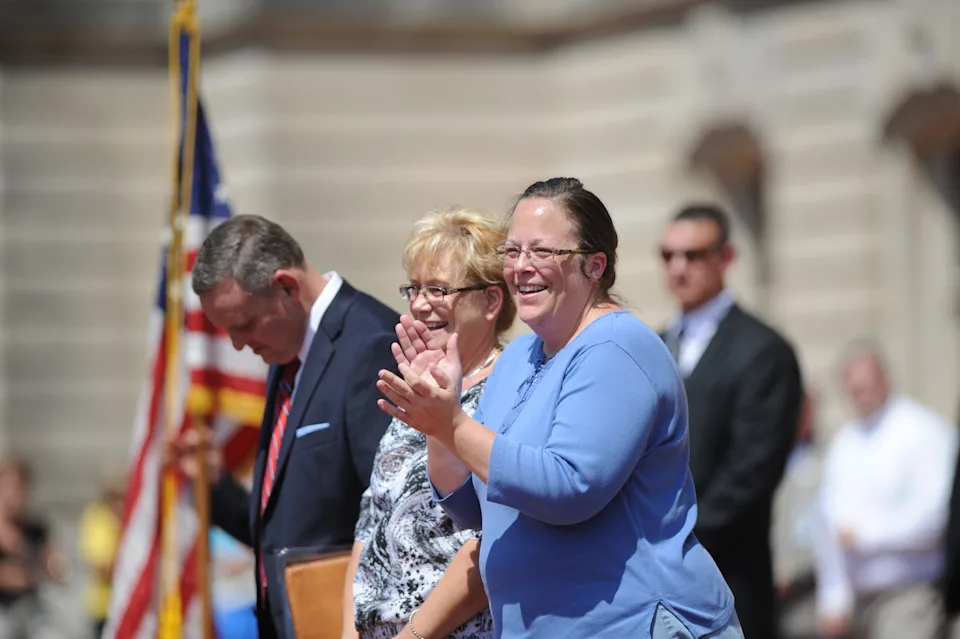Ten years after the Supreme Court legalized same-sex marriage nationwide, the justices will soon decide whether to hear a case that could reopen the debate.
Kim Davis, the former Kentucky clerk briefly jailed in 2015 for refusing to issue marriage licenses to gay couples, is appealing a $100,000 damages verdict plus $260,000 in legal fees. Her petition argues that the First Amendment’s religious protections shield her from personal liability — and more significantly, that Obergefell v. Hodges itself was “egregiously wrong.”
Her lawyer, Mathew Staver, called Justice Anthony Kennedy’s 2015 majority opinion “legal fiction” and urged the Court to correct what he described as a constitutional mistake.
Lower Courts Reject Davis’ Claim
Federal courts have consistently ruled against Davis. A U.S. appeals court panel concluded that she could not invoke the First Amendment because, as a government official, she acted on behalf of the state.
Attorneys for David Ermold and David Moore — the Kentucky couple denied a license by Davis — said her latest appeal is baseless. “Not a single judge on the U.S. Court of Appeals showed any interest in Davis’s rehearing petition,” said William Powell, the couple’s lawyer. “We are confident the Supreme Court will likewise agree.”

Renewed Push to Reverse Obergefell
Davis’ filing comes as conservative activists and some Republican-led states push to revisit same-sex marriage precedent. According to Lambda Legal, at least nine states this year have introduced legislation or resolutions aimed at challenging Obergefell.
The Southern Baptist Convention recently passed a resolution declaring the reversal of Obergefell a “top priority,” while citing religious liberty concerns.
Public Opinion and Political Headwinds
Gallup polling shows broad support for marriage equality — 70% of Americans back same-sex marriage in 2025, up from 60% in 2015. But support among Republicans has dropped from 55% in 2021 to 41% today.
Josh Blackman, a conservative constitutional scholar, said many justices may prefer to let lower courts wrestle with the issue before intervening. “It is hard to say where things will go, but this will be a long slog considering how popular same-sex marriage is now,” he said.
Labubu Toy Heist: $7K Stolen from California Store Amid Soaring Demand
The Roe v. Wade Parallel
Davis’ petition explicitly compares Obergefell to abortion rights precedent. She cites the Court’s 2022 decision overturning Roe v. Wade and Justice Clarence Thomas’ concurring opinion, which urged reconsideration of Obergefell and other substantive due process rulings.
Still, analysts doubt the Court’s current conservative majority is eager to take up the issue directly. “There is no world in which the court takes the case as a straight gay marriage case,” said Sarah Isgur, legal analyst. “It would have to come up in another context first.”
Impact of a Potential Reversal
Even if Obergefell were overturned, the 2022 Respect for Marriage Act requires states and the federal government to recognize existing same-sex and interracial marriages performed legally anywhere in the U.S. That law protects nearly 823,000 married same-sex couples, according to UCLA’s Williams Institute, including nearly 600,000 marriages performed since Obergefell.
What Comes Next
The Supreme Court will privately review Davis’ petition this fall. If the justices agree to hear the case, arguments would likely take place in spring 2026 with a decision by June. If denied, lower court rulings against Davis will stand, leaving Obergefell intact.
Chief Justice John Roberts, who dissented from Obergefell in 2015, criticized it at the time as “an act of will, not legal judgment.” Davis’ petition leans heavily on his warning that the decision could spark religious liberty conflicts.
For now, the Court must decide whether Davis’ case represents a true vehicle to revisit one of the most consequential rulings of the past generation.






